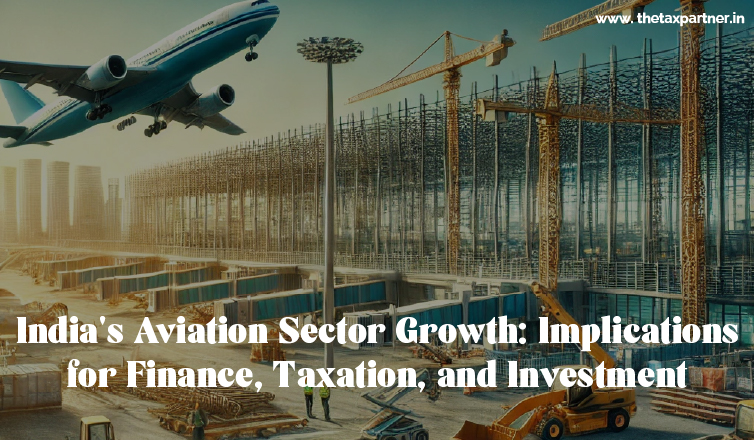Connect with us for all your queries



With domestic passenger demand expected to double within the next five years, India’s aviation sector is attracting significant attention from private equity, venture capital, and foreign investors. Infrastructure projects, including airport development and aircraft manufacturing, offer diverse investment avenues. Private investments are anticipated not only in airport construction but also in the auxiliary services that support the aviation ecosystem—ground services, maintenance, and commercial spaces within airport premises.
For investors, these developments underscore the need for a structured financial approach to optimize returns. Investment strategies can include direct equity stakes in aviation companies, bonds in infrastructure projects, or partnerships with the government in public-private partnership (PPP) models. TaxPartner can assist investors in crafting tax-efficient structures to maximize post-tax returns on aviation-related investments, providing insights into capital gains tax implications, compliance with Foreign Direct Investment (FDI) policies, and tax incentives available under various schemes.
The civil aviation sector is subject to a unique set of tax regulations, spanning from import duties on aircraft to GST on ticketing and aviation fuel. Expansion in this sector calls for meticulous tax planning to benefit from government incentives and minimize tax liabilities. Under the National Civil Aviation Policy, there are potential tax benefits, including exemptions or reductions on excise duties and state-level tax incentives that aim to lower operational costs for airlines and encourage investment.
Additionally, with the government’s focus on domestic aircraft manufacturing, entities in this segment may qualify for deductions under Section 35AD for capital expenditure and accelerated depreciation benefits, fostering greater tax savings. TaxPartner is poised to guide companies through the complexities of aviation taxation, helping them leverage available benefits and meet compliance requirements efficiently.
The government’s investment in aviation infrastructure is expected to drive regional economic growth through job creation and ancillary business opportunities. As new airports are established, there will be an influx of employment opportunities in sectors such as real estate, retail, and logistics. This influx will require local businesses to align with GST and other tax obligations to operate seamlessly within airport zones. For companies seeking tax compliance or optimization, TaxPartner offers comprehensive support, simplifying GST filings, advisory on local tax incentives, and structuring assistance for long-term fiscal efficiency.
The government’s collaborative initiatives with Hindustan Aeronautics Limited (HAL) and National Aerospace Laboratories (NAL) to establish a domestic aircraft manufacturing sector will create further tax planning needs for businesses entering this space. Startups and enterprises engaged in R&D or manufacturing could potentially benefit from Research and Development (R&D) tax credits, accelerated depreciation, and other Make in India incentives, including reduced corporate tax rates.
In this scenario, a robust tax strategy is crucial for companies to capitalize on all available tax benefits. TaxPartner can help aviation entities navigate these incentives, ensuring compliance while optimizing tax liability. Our expertise covers advisory on GST and customs duty on aircraft parts, consultancy on capital allowances, and structuring solutions for joint ventures.
India’s aviation sector is positioned for robust growth, presenting promising opportunities for investors, infrastructure developers, and manufacturers. However, navigating the tax and financial implications of this expansion requires specialized expertise. At TaxPartner, we are dedicated to providing tailored solutions that address the unique needs of businesses and investors in the aviation sector, helping them maximize tax benefits, ensure regulatory compliance, and structure investments for long-term gains. As India’s aviation sector reaches new heights, we are here to guide our clients every step of the way.
Tax Partner is India’s most reliable online business service platform, dedicated to helping you in starting, growing, & flourishing your business with our wide array of expert services at a very affordable cost.